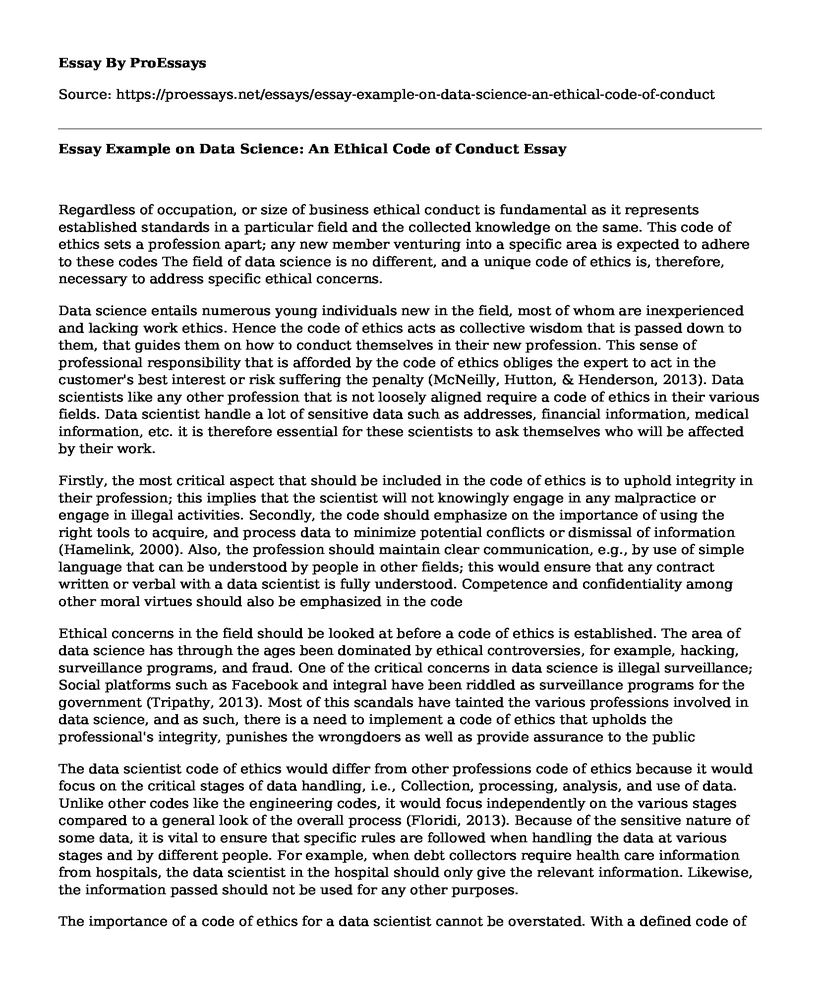Regardless of occupation, or size of business ethical conduct is fundamental as it represents established standards in a particular field and the collected knowledge on the same. This code of ethics sets a profession apart; any new member venturing into a specific area is expected to adhere to these codes The field of data science is no different, and a unique code of ethics is, therefore, necessary to address specific ethical concerns.
Data science entails numerous young individuals new in the field, most of whom are inexperienced and lacking work ethics. Hence the code of ethics acts as collective wisdom that is passed down to them, that guides them on how to conduct themselves in their new profession. This sense of professional responsibility that is afforded by the code of ethics obliges the expert to act in the customer's best interest or risk suffering the penalty (McNeilly, Hutton, & Henderson, 2013). Data scientists like any other profession that is not loosely aligned require a code of ethics in their various fields. Data scientist handle a lot of sensitive data such as addresses, financial information, medical information, etc. it is therefore essential for these scientists to ask themselves who will be affected by their work.
Firstly, the most critical aspect that should be included in the code of ethics is to uphold integrity in their profession; this implies that the scientist will not knowingly engage in any malpractice or engage in illegal activities. Secondly, the code should emphasize on the importance of using the right tools to acquire, and process data to minimize potential conflicts or dismissal of information (Hamelink, 2000). Also, the profession should maintain clear communication, e.g., by use of simple language that can be understood by people in other fields; this would ensure that any contract written or verbal with a data scientist is fully understood. Competence and confidentiality among other moral virtues should also be emphasized in the code
Ethical concerns in the field should be looked at before a code of ethics is established. The area of data science has through the ages been dominated by ethical controversies, for example, hacking, surveillance programs, and fraud. One of the critical concerns in data science is illegal surveillance; Social platforms such as Facebook and integral have been riddled as surveillance programs for the government (Tripathy, 2013). Most of this scandals have tainted the various professions involved in data science, and as such, there is a need to implement a code of ethics that upholds the professional's integrity, punishes the wrongdoers as well as provide assurance to the public
The data scientist code of ethics would differ from other professions code of ethics because it would focus on the critical stages of data handling, i.e., Collection, processing, analysis, and use of data. Unlike other codes like the engineering codes, it would focus independently on the various stages compared to a general look of the overall process (Floridi, 2013). Because of the sensitive nature of some data, it is vital to ensure that specific rules are followed when handling the data at various stages and by different people. For example, when debt collectors require health care information from hospitals, the data scientist in the hospital should only give the relevant information. Likewise, the information passed should not be used for any other purposes.
The importance of a code of ethics for a data scientist cannot be overstated. With a defined code of ethics, data scientist new and old will handle data with care, establish clear values, missions and guiding policy in their occupations. Their data systems will also, as a result, create better customer relations and overall reduce misconduct and ethical concerns that have for so long riddled data science.
References
Floridi, L. (2013). The ethics of information. Oxford University Press.
Hamelink, C. J. (2000). The ethics of cyberspace. Sage.
McNeilly, S., Hutton, L., & Henderson, T. (2013, February). Understanding ethical concerns insocial media privacy studies. In Proceedings of the ACM CSCW Workshop on Measuring Networked Social Privacy.
Tripathy, J. P. (2013). Secondary data analysis: Ethical issues and challenges. Iranian journal of public health, 42(12), 1478.
Cite this page
Essay Example on Data Science: An Ethical Code of Conduct. (2022, Dec 29). Retrieved from https://proessays.net/essays/essay-example-on-data-science-an-ethical-code-of-conduct
If you are the original author of this essay and no longer wish to have it published on the ProEssays website, please click below to request its removal:
- Children's Mercy Healthcare Facility Analysis
- Paper Example on Nuclear Weapons Should be Eliminated
- Essay on Rousseau' Central Criticism of Enlightenment Tradition
- Evaluation Essay on LG Corporation
- The American Dream Essay Example
- Testing on Human Vs Testing on Animals Essay Example
- Online Listening Research Experiment: Essay Sample







